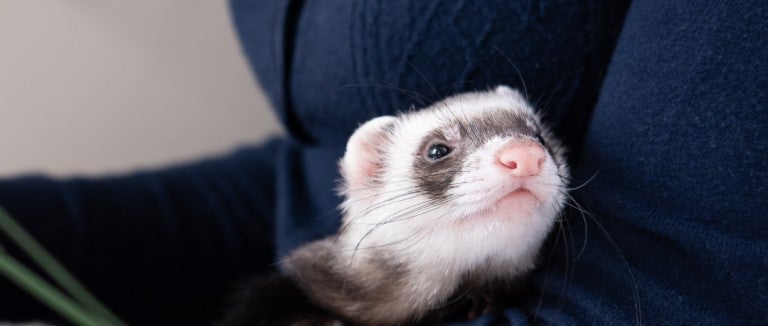While domestic ferrets have become more popular as pets in recent years and can be kept legally as pets in most states, it's still best to check state and local laws, as there are select states which do not allow them as pets. As with any companion animal, these furry creatures deserve lifelong, responsible homes and caretakers.
If you're thinking of getting a ferret, here are some things to keep in mind before taking steps to add a ferret to your family.
Adopt, don't shop
The Humane Society of the United States believes that ferrets, like other companion animals, should not be bred for commercial purposes or sold in retail pet stores. If you are thinking of adding a ferret to your family, see if an animal shelter or rescue group near you has any ferrets for adoption. There may be species-specific rescues in your area that specialize in unique species, and adoption websites like Petfinder might also advertise adoptable animals.
Special considerations
Ferrets are very different from more traditional companion animals such as dogs and cats. They are marketed by the pet industry as "unusual," but individuals considering adopting a ferret should not do so as a novelty, and should be aware that these pets are not low maintenance. Ferrets require a high level of commitment to be cared for responsibly and humanely; individuals not prepared or able to make such a commitment should not keep ferrets as pets.
Responsible care
Ferrets have sharp teeth and occasionally bite when startled, excited or handled improperly. There have even been incidents when small children have been seriously injured by ferret bites. Children, particularly infants, should never be left unsupervised with ferrets (or with any other companion animal). Although relatively tough, ferrets can fracture their spine or limbs if they wiggle out of someone’s arms or off a surface. They can have sharp nails that can scratch and require trimming often. They also sometimes require bathing and ear cleaning.
Like all mammals, ferrets can carry and transmit rabies. Therefore, all ferrets should be vaccinated against this fatal viral disease. They also can easily contract distemper, which is almost always fatal, and it is also recommended to vaccinate for this disease as well.
Sign up to receive our exclusive e-book full of important information about caring for your pet, including training techniques and answers to frequently asked questions.

Needs and habits
Keeping ferrets humanely may be a challenge for individuals who are unfamiliar with their needs and habits. Ferrets sleep much of the time, but when awake are both curious and highly active. They are crepuscular, which means they are most active at dusk or dawn. They are extremely social animals, and do very well in a multi-ferret household.
They should not be confined to a cage at all times, yet need close supervision when allowed out of their enclosures. It is usually necessary to take special measures to "ferret-proof" homes where ferrets are kept to ensure their safety. Ferrets are clever and mischievous, and can climb and slink through small spaces. It is common for them to chew on cables and ingest small objects found on the floor, which may lead to electrocution or intestinal blockage.
Ferrets require very specific housing. Because they like to climb and explore, multi-level cages are best for them. They enjoy dark places to hide and sleep, so tubes or hammocks provide them a nice refuge. Cages should be large, at least 3 feet by 3 feet by 2 feet for a single ferret, to allow ample room for exploration.
They can be relatively easily litter trained and any non-edible non-clumping litter material can be used. They enjoy soft bedding, such as baby blankets. Towels should be avoided, as claws can be easily caught in the loops. Wire cage bottoms should be covered to prevent injury to the feet.
Unlike other exotic companion mammals, ferrets are carnivores and require a meat-based diet. A high-quality ferret pellet is the simplest, most balanced diet for them. It can be supplemented with cooked meats and small amounts of other proteins such as boiled egg, crickets, worms and other proteins. Fruits, vegetables and high-carbohydrate foods are not appropriate for ferrets.
Like other companion animals, ferrets require periodic veterinary check-ups and veterinary care when needed. Be sure to find a veterinarian in your community who is experienced with ferret care before adopting. In the U.S., the pet ferret population is prone to a variety of issues like adrenal gland disease and cancers like lymphoma. Anyone considering adding a ferret to their home should research these issues carefully, along with their special care needs, to make sure they are financially able to care for them should they develop a chronic disease. Getting pet insurance is a good idea for these companions, as appropriate veterinary care may be costly.
Stinky?
To put it kindly, ferrets don't always come up smelling like roses. A ferret's sebaceous glands, which are used to mark territory, secrete oil with a natural musky odor and the animal's anal scent glands can spray just like a skunk’s. In the U.S., most ferrets are sold descented, but even so have an oily coat and a strong, musky odor.
Sterilization
Pet ferrets must be spayed or neutered to prevent them from adding to the numbers of unwanted and homeless ferrets in need of shelter and rescue. Sterilization is particularly important for female ferrets, who can contract a disease called fatal aplastic anemia. Ferrets bred in the United States are usually sold spayed and neutered at a young age.
